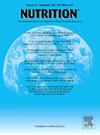Navigating nutrition through the decades: Tailoring dietary strategies to women's life stages
IF 3.2
3区 医学
Q2 NUTRITION & DIETETICS
引用次数: 0
Abstract
The female-specific hormones are responsible for the different metabolic changes occurring in the overall well-being of a woman. Especially highlighted phases are the onset of puberty, menarche, pregnancy, lactation, and menopause. They involve significant metabolic changes, which alter the nutritional requirements. Women, in general, are often unaware of these varied nutritional requirements and fail to inculcate them in their diet, influencing their health. Increased calories, protein, iron, and calcium consumption during adolescence is required for bone growth and the prevention of osteoporosis later in life. The availability through a balanced diet of zinc and essential vitamins such as D, K, and B12 is also critical for a rapidly growing body. At present, infertility is also a pressing issue for couples. Female fertility can be enhanced by a diet high in plant-based protein, dietary fiber, omega-3 fatty acids, vitamins, and minerals. Foods rich in omega-3 fatty acids can help to enhance the quality of eggs, and plant-based proteins reduce the incidence of infertility. Thereafter, during pregnancy, nutritional requirements increase, especially for vitamins B6, B12, and D, calcium, proteins, folate, zinc, and iron. A properly balanced diet can satisfy basic nutritional requirements. However, iron supplements are essential for supporting the blood supply to the placenta and fetus. During menopause and menopausal transition, symptoms are observed like vaginal dryness, hot flashes, and irregular menstruation, followed by an increased threat of cardiovascular diseases, tumors, type 2 diabetes, and osteoporosis. Sufficient intake of protein, calcium, vitamins B, C, and D, and omega-3 fatty acids is important in managing the symptoms. The strategic combination of antioxidant-rich foods with a low-fat, plant-based diet can reduce the risk of cardiovascular disease and regulate body mass. The conclusion of this review is that timely changes in nutrition and strategizing dietary supplements can ease the transition phases of the female lifecycle and improve quality of life.

几十年来的营养导航:为女性的生命阶段量身定制饮食策略
女性特有的激素负责女性整体健康中发生的不同代谢变化。特别突出的阶段是青春期的开始,月经初潮,怀孕,哺乳期和更年期。它们涉及显著的代谢变化,从而改变营养需求。一般来说,妇女往往不知道这些不同的营养需求,也没有在饮食中灌输这些需求,从而影响了她们的健康。青春期增加卡路里、蛋白质、铁和钙的摄入是骨骼生长和预防以后的骨质疏松症所必需的。通过均衡饮食获得锌和必需维生素如D、K和B12对快速生长的身体也是至关重要的。目前,不孕不育对夫妻来说也是一个紧迫的问题。女性的生育能力可以通过富含植物性蛋白质、膳食纤维、omega-3脂肪酸、维生素和矿物质的饮食来提高。富含omega-3脂肪酸的食物可以帮助提高鸡蛋的质量,植物性蛋白质可以减少不孕症的发生率。此后,在怀孕期间,营养需求增加,特别是维生素B6、B12和D、钙、蛋白质、叶酸、锌和铁。适当均衡的饮食可以满足基本的营养需求。然而,铁补充剂对于支持胎盘和胎儿的血液供应是必不可少的。在更年期和更年期过渡期间,可以观察到阴道干燥、潮热和月经不调等症状,其次是心血管疾病、肿瘤、2型糖尿病和骨质疏松症的风险增加。摄入足够的蛋白质、钙、维生素B、C、D和omega-3脂肪酸对控制症状很重要。将富含抗氧化剂的食物与低脂肪的植物性饮食相结合,可以降低患心血管疾病的风险,并调节体重。本综述的结论是,及时改变营养和有策略的膳食补充剂可以缓解女性生命周期的过渡阶段,提高生活质量。
本文章由计算机程序翻译,如有差异,请以英文原文为准。
求助全文
约1分钟内获得全文
求助全文
来源期刊

Nutrition
医学-营养学
CiteScore
7.80
自引率
2.30%
发文量
300
审稿时长
60 days
期刊介绍:
Nutrition has an open access mirror journal Nutrition: X, sharing the same aims and scope, editorial team, submission system and rigorous peer review.
Founded by Michael M. Meguid in the early 1980''s, Nutrition presents advances in nutrition research and science, informs its readers on new and advancing technologies and data in clinical nutrition practice, encourages the application of outcomes research and meta-analyses to problems in patient-related nutrition; and seeks to help clarify and set the research, policy and practice agenda for nutrition science to enhance human well-being in the years ahead.
 求助内容:
求助内容: 应助结果提醒方式:
应助结果提醒方式:


